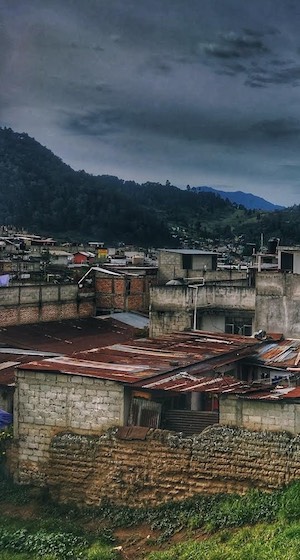
Text by Rosa Alvarez Velez
Most of us have heard the stories of immigrants who come to the United States in search for a better life but are forced into the shadows, the horror stories of separation at the border, and what happens inside immigrant detention centers.
But we don’t often hear the stories of returnees, that is, migrants who are deported or who, for a host of different reasons, decide to return to their countries of origin. In the larger migration story, returnees are just one more statistic, anonymous people for whom the “American dream” never comes true.
As part of my graduate work at UT Austin, I traveled to Guatemala last summer to interview women returnees. Talking to these women, I learned that each story is unique, that life continues after returning, and that people find resilient ways of surviving and thriving in the midst of much pain and struggle.
Here I highlight the impact that migration had on the familial relationships of four of the women who shared their stories with me. These are only glimpses into their lives and cannot encompass their full experience and resilience.
Maricruz – 32 years old, migrated as unaccompanied minor, voluntary return at age 17
“I would tell myself that I was going to work hard, I was going to help my grandmother, I was going to send for my sister [who stayed back in Guatemala]. I was going to do for my sister what my mom couldn’t do. I quickly learned that I could not just send for my sister to come to the United States, and that she couldn’t migrate the way I did because she struggled with schizophrenia. In 2002, after spending years in the United States, my family learned that someone had broken into our house in Guatemala and sexually abused my sister. My mom was making plans to return when I volunteered to come back myself. My baby brother had just been born, and he needed my mom to stay.

“Part of me arrived extremely sad. I had left family and the possibilities of having a different future. As a little girl I never had to worry about what was going on around me: if there was violence, if there were bills to pay. All of a sudden, I had to adapt to something completely different and take charge of my own responsibilities. In the United States, despite the fact that I was 17, it was as if my mom held my hand. But there was no one to hold my hand when I came back to Guatemala. On the contrary, I had to hold my sister’s hand and guide her. From one day to the next, I transformed from being a girl into being a woman. As time went on, I realized that people here have the perspective that if you’ve lived in the United States you are promiscuous, so I would get harassed a lot. I had to fight against that, take my place and show everyone that I wasn’t the way they saw me. It was crazy to think about the fact that I traveled alone to the United States when I was 11 and no one laid a hand on me, but I was raped by someone who I thought was my friend when I came back to Guatemala. I regretted ever coming back.”
Alejandra – 44 years old, deported after living in United States for over 20 years, separated from her son
“During our first two years back in Guatemala we stayed focused and felt productive while taking care of our new restaurant. It was almost as if nothing had changed. We were so busy trying to be providers for our son, who we brought back with us, that we didn’t realize that he was going through a very severe depression. We tried to find the best place possible for him, but it wasn’t easy because he really struggled to adjust here. It was a very difficult decision for us because he is our only son, but when we asked him if he wanted to go back to the United States and he said yes, we realized it was the right thing to do.
“That is the hardest part of me until this day, and I think it will always be. I have missed so many important events in my son’s life and it’s something that I haven’t overcome. As a mother it is very hard because I couldn’t be there when he graduated [from] middle school, I couldn’t be there when he graduated [from] high school, and so many other really important things. As much as it hurts, I can’t be selfish to have him close to me if he has other aspirations in life. He returned to the United States when he was 12 and has lived with a few different friends who have very kindly offered to help. But he really struggled in high school because he had to wake up at 4:30 in the morning to take three buses to school. When it rained, he would get wet, when it was cold, he would suffer through it. Those are the things that as a mother make me feel absolutely horrible.”
Valeria – 41 years old, reunited with oldest son in Guatemala after living in the United States for 10 years
“My son was two-and-a-half years old when I left him on my journey to reunite with my husband in the United States. At the moment that I left, I wanted to take him with me, and it was always my intention to send for him. But the years passed, and we began to create a new life in the United States. In 2004 we made a very abrupt decision to return to Guatemala after we experienced some violence in the business we owned. At that point my son was already 12 years old, and I was filled with emotion thinking about how long we had been way from him. One can’t stop them from growing, I have to educate him, be with him, spend time with him, take care of him. I had stopped sharing time with him for many years, and my husband hadn’t seen him since he was 3 months old.

“It was hard to communicate with him when we were reunited. Four years after we returned, he finally stared expressing the resentment he felt towards us and began to reject us. He felt abandoned because we left him, and he felt that we prioritized the other children over him. Migration has many positive and negative consequences. For us, the positives were economic, but the negatives were deeply personal.”
Elena – 31 years old, signed voluntary deportation at age 18 after living in United States since age 6.
“I had depression when I was a teenager so when a friend in high school who was always happy told me that he was taking some type of ‘natural’ medication that would help him out and asked me if I wanted to try it, I thought, ‘I’ve tried everything to make me happy it doesn’t work, so if it makes you happy let’s do it.’ I took a pill before going to school the following morning and when I got there, I felt like I was going to die. My face got numb, I stopped talking, and I had to be taken to the hospital.
“My dad went back to school the next day with the pill I had left to make sure there were consequences for the person who gave them to me. But instead, I got locked up right then and there. I was in jail for 14 days with women who had committed much more serious crimes than me. I felt like it was unfair that they were punishing me so harshly for what I did, but because I was undocumented, I didn’t have any choices. A few days later I saw that the guy who gave me the pills was arrested, but because he’s a citizen, he was only locked up for a few days before he got out. He got to go home, and I got deported. People told me to run away, but I would have been hiding my entire life and I knew that eventually they would get me, and it would be worse. Instead, I signed my voluntary departure so I could spend my last 6 months with my family and friends.
“Now that I am here, apart from struggling to get used to how different everything is here, I miss my mom. I miss her face, hugging her, seeing her in the morning. I miss her perfumes. Not having her here been the hardest part. I know if I had her here with me, I would be doing even better than I am on my own. If you go and ask my mom about me, she’ll tell you all my qualities, and I always feel how much she loves and supports me. I even miss her scolding me.”
Rosa Alvarez Velez is a master’s student completing a dual degree in social work and Latin American Studies at The University of Texas at Austin.
